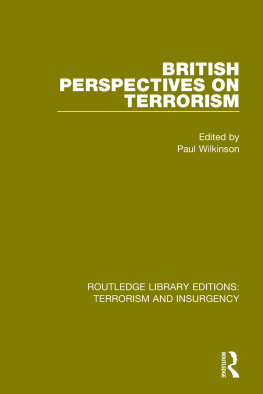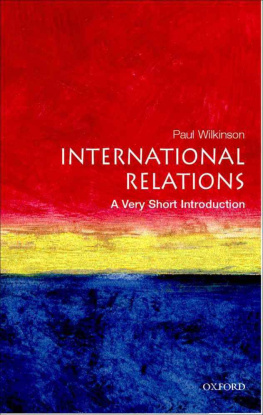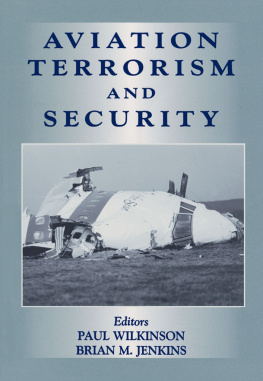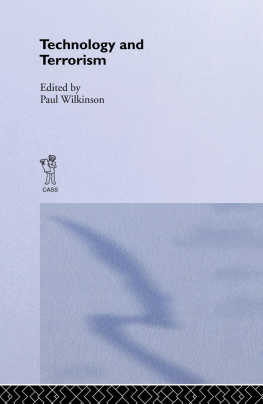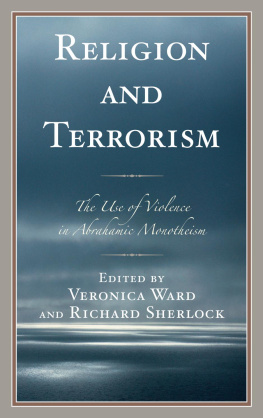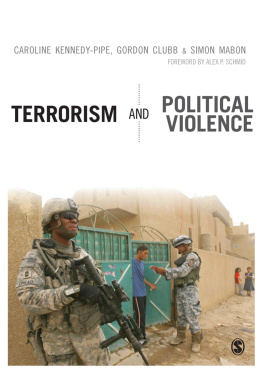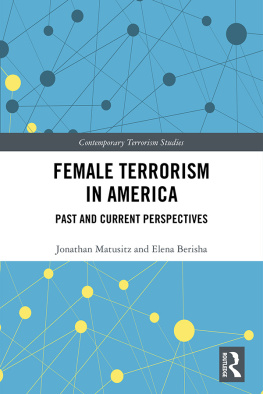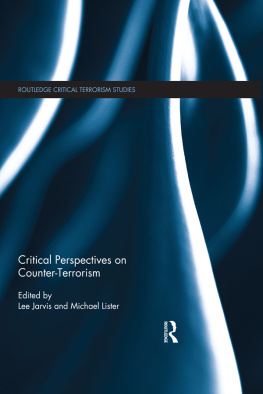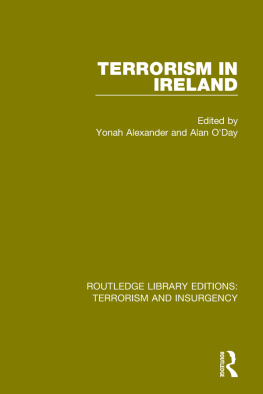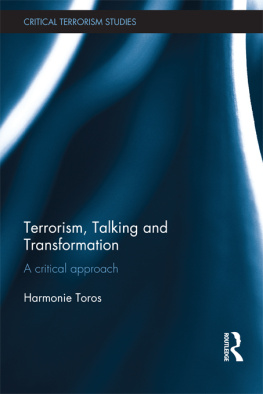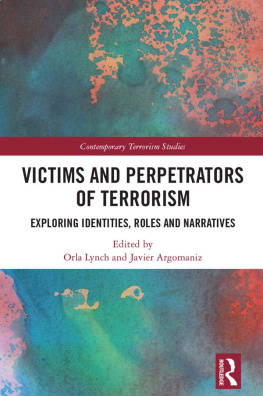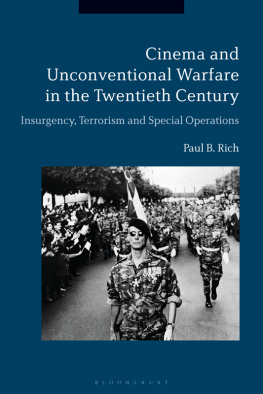ROUTLEDGE LIBRARY EDITIONS: TERRORISM AND INSURGENCY
Volume 9
BRITISH PERSPECTIVES ON TERRORISM
BRITISH PERSPECTIVES ON TERRORISM
Edited by
PAUL WILKINSON
First published 1981 as Volume 5, Nos. 1 & 2 Terrorism: An International Journal
This edition first published in 2015
by Routledge
2 Park Square, Milton Park, Abingdon, Oxon OX14 4RN
and by Routledge
711 Third Avenue, New York, NY 10017
Routledge is an imprint of the Taylor & Francis Group, an informa business
1981 Crane, Russak & Company, Inc.
All rights reserved. No part of this book may be reprinted or reproduced or utilised in any form or by any electronic, mechanical, or other means, now known or hereafter invented, including photocopying and recording, or in any information storage or retrieval system, without permission in writing from the publishers.
Trademark notice: Product or corporate names may be trademarks or registered trademarks, and are used only for identification and explanation without intent to infringe.
British Library Cataloguing in Publication Data
A catalogue record for this book is available from the British Library
ISBN: 978-1-138-83955-7 (set)
eISBN: 978-1-315-69683-6 (set)
ISBN: 978-1-138-89924-7 (Volume 9)
eISBN: 978-1-315-70791-4 (Volume 9)
Publishers Note
The publisher has gone to great lengths to ensure the quality of this reprint but points out that some imperfections in the original copies may be apparent.
Disclaimer
The publisher has made every effort to trace copyright holders and would welcome correspondence from those they have been unable to trace.
British Perspectives on Terrorism
Edited by
Paul Wilkinson
London
GEORGE ALLEN & UNWIN
Boston Sydney
1981 Crane, Russak & Company, Inc.
This book is copyright under the Berne Convention. No reproduction without permission. All rights reserved.
George Allen & Unwin (Publishers) Ltd,
40 Museum Street, London WC1A 1LU, UK
George Allen & Unwin (Publishers) Ltd,
Park Lane, Hemel Hempstead, Herts HP2 4TE, UK
Allen & Unwin Inc.,
9 Winchester Terrace, Winchester, Mass 01890, USA
George Allen & Unwin Australia Pty Ltd,
8 Napier Street, North Sydney, NSW 2060, Australia
First published in 1981
as Volume 5, Nos. 1 & 2 Terrorism: An International Journal
British Library Cataloguing in Publication Data
British perspectives on terrorism.
1. Terrorism Addresses, essays, lectures.
I. Wilkinson, Paul
322.42 HV6431
ISBN 0-04-327064-6
ISBN 0-04-327065-4 Pbk
Library of Congress Cataloging in Publication Data
Main entry under title:
British perspectives on terrorism.
First published in 1981 as volume 5, nos. 1 & 2, Terrorism: an international journal T.p. verso
Contents: Introduction/Paul Wilkinson Politics and propaganda of the Provisional IRA/Maurice Tugwell The water and the fish/E. Moxon-Browne [etc.]
1. Terrorism Great Britain Addresses, essays, lectures.
2. Terrorism Northern Ireland Addresses, essays, lectures.
3. Terrorism Addresses, essays, lectures. I. Wilkinson, Paul.
II. Terrorism; v. 5, no. 12.
HV6433.G7B74 303.62 817937
ISBN 0-04-327064-6 AACR2
ISBN 0-04-327065-4 (pbk.)
Cover photograph shows Provisional IRA gunmen in the Falls Road, Belfast on Sunday, 12 August 1979.
Printed in Great Britain by Biddies Ltd, Guildford, Surrey
Contents
PAUL WILKINSON
Politics and Propaganda of
the Provisional IRA
MAURICE TUGWELL
The Water and the Fish:
Public Opinion
and the Provisional
IRA in Northern Ireland
E. MOXON-BROWNE
EDGAR OBALLANCE
Terror in Ireland
and Britains Response
MERLYN REES
Another Final Battle
on the Stage of History
JILLIAN BECKER
The British Police
and Terrorism
F.E.C. GREGORY
Management of
the Kidnap Risk
RICHARD CLUTTERBUCK
The United Nations Convention
Against the Taking of Hostages:
Realistic or Rhetoric?
CLIVE C. ASTON
Proposals for Government and
International Responses to Terrorism
PAUL WILKINSON
Paul Wilkinson
The strengths and weaknesses of British research and writing on terrorism reflect, to an almost uncanny extent, the basic paradox of the recent British experience of political violence. The fact is that Great Britain has enjoyed freedom from major internal strife and violence for over one hundred and fifty years: the last mainland armed rebellion against the Crown was in 1745 and England, Scotland, and Wales have been virtually free of mass riots and disorders since the early nineteenth century. Yet, in total contrast, John Bulls other Island experienced a whole series of bloody internal conflicts throughout this period, from the Wolf Tone Rebellion to the Irish independence struggle of 191921, and the grim civil war that followed.
Thus, for successive British governments in the nineteenth and early twentieth centuries, serious internal violence was essentially a colonial problem, an inescapable element of the White Mans Burden which only reached British popular awareness as a series of battle honors won by the small all-volunteer British Army in defense of the Empire. Hence, from the British perspective, terrorism, violent insurrection, and guerrilla warfare were phenomena experienced by unfortunate and unruly foreigners. Almost by definition, such things did not, indeed could not, occur in the mother country where, according to fashionable belief, progress had wrought a parliamentary democracy and a rule of law in which such reversions to tooth and claw were not merely unlikely but unthinkable.
This enormous psychological gulf between domestic tranquility and foreign strife continued, indeed was strengthened, in the post-1945 period. For despite the almost continuous efforts by British governments of the 1950s and 1960s to negotiate peaceful handovers to independence movements in former colonies in Asia, Africa, and the Middle East, violence did occur, prior to independence being negotiated, in Malaya, Kenya, Cyprus, Aden, and Rhodesia, and prior to the relinquishing of the British mandate in Palestine. Critics and detractors of British policy in these areas often claim that these conflicts were entirely the fault of British administrations. No doubt there were numerous errors of judgment in the making and execution of policy. But it should be remembered that the British authorities had inherited particularly intractable political problems in all these areas.
In Palestine, Cyprus, Aden, and Rhodesia the efforts to achieve a peaceful transition were bedeviled by civil war between rival ethnic and political groups battling to take control within each country. Thus, in these cases, the British government was unable to deal with any single bargaining agent in the colony that enjoyed support and legitimacy in the eyes of the whole population. And in all these cases, with the exception of Rhodesia, British forces became sucked into the internecine conflict in an effort to restore order and stability.
By the time of Mr. Ian Smiths 1965 Unilateral Declaration of Independence in Rhodesia Britain was too weakened, militarily and economically, to intervene to restore Crown authority. Mr. Harold Wilson, British Prime Minister at that time, and his colleagues, possessed neither the will nor the means to act.

